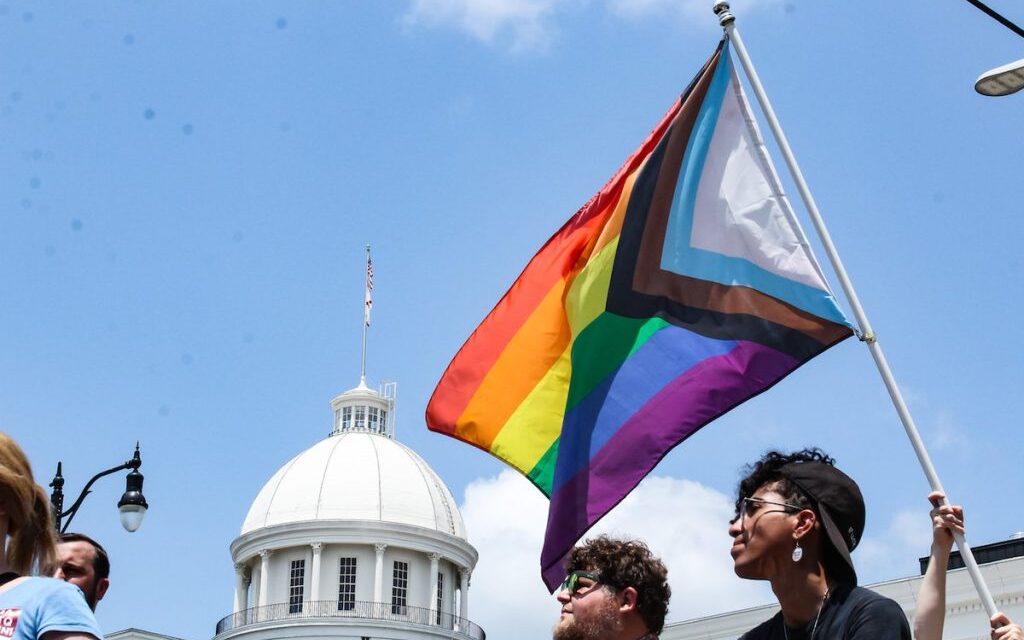Two controversial bills that would limit LGBTQ topics and sex education in Alabama classrooms are advancing for a final vote in the state legislature.
After last-minute public hearings, a Senate committee voted along party lines to approve House Bill 195, which would update the state’s sex education curriculum, and House Bill 130, an expanded “Don’t Say Gay” bill that would prevent K-8th grade teachers from discussing LGBTQ topics in the classroom.
The bills follow a wave of conservative legislation across the nation that seeks to restrict sex education and classroom discussions about sexual orientation and gender identity. Since 2021, at least 22 states have considered legislation limiting in-school discussion about the topics, according to Education Week.
In committee Wednesday, a Republican majority voted to move the bills forward, despite pushback from Democrats and members of the public. If approved by the full Senate without amendments, they go to Gov. Kay Ivey for signature.
“I really am tired of us trying to legislate fears and dislikes and even getting to the point of trying to legislate morality,” Sen. Kirk Hatcher, D-Montgomery, told the committee.
The sex education bill
Alabama’s current sex ed standards emphasize abstinence, but require that discussions must be medically accurate.
Rep. Susan DuBose, R-Hoover, said she wrote HB195 to keep “certain groups” from teaching information that is not approved, and to ensure that the lessons remain optional.
The bill allows discussion of contraception, but further defines what sexual education content is age appropriate and medically accurate. It outlaws any discussion of how to obtain abortion services and prevents providers that are not “aligned with the exclusive message of sexual risk avoidance,” from teaching the topic in public schools.
The bill also makes it easier for parents to review sex ed materials or opt their child out of lessons.
In a public hearing Wednesday, advocates said the bill would undo earlier efforts to strengthen Alabama’s sex ed standards.
One parent, Courtney McKenny, who is also a staffer at a Unitarian church in Birmingham, said her three teenagers would have benefited from comprehensive sex education. She said her oldest daughter, who is now a nursing student, struggled through an anatomy class because teachers shied away from discussing the reproductive system.
A 2020 report from Human Rights Watch found that Alabama schools were failing to educate young people about their sexual and reproductive health, citing standards that weren’t inclusive of LGBTQ youth and focus on abstinence – a practice that experts say is ineffective, stigmatizing and can lead to higher rates of unsafe sex.
The bill could also make the state ineligible for millions of dollars of federal funding, said Vanessa Tate Finney, the director of policy and advocacy at AIDS Alabama. Her organization is one of several groups working with the state public health department to provide sexual risk avoidance and state mandated HIV prevention education to Alabama youth.
“It’s a solution in search of a problem that doesn’t, hasn’t, and won’t ever exist in Alabama,” she said.
Lawmakers voted 7-2 to give the bill a favorable report. It will go to the full chamber.
The ‘Don’t Say Gay’ bill
HB130, sponsored by Rep. Mack Butler, R-Rainbow City, expands on legislation Alabama passed in 2022 and similar to Florida legislation nicknamed “Don’t Say Gay.”
The current law prohibits discussion of sexual orientation and gender identity in K-5 classrooms. This year’s bill originally sought to expand the ban to include all of K-12, but was cut down in the House to only extend through eighth grade. The new bill also would ban teachers from displaying LGBTQ+ pride flags on public school property.
In an earlier committee, Butler said the bill was intended to prevent the indoctrination of Alabama youth with information about LGBTQ people, and called the legislation an effort to “purify the schools.”
When previously asked by AL.com for examples, Butler pointed to a 2019 reading assignment that explored a story about a boy who liked playing with dolls and asked students about how they felt about their identity. Butler said the assignment was not given again.
Wednesday’s hearings were limited to three speakers. An Iraq veteran, Travis Jackson, compared the bill to “a civilian version of Don’t Ask Don’t Tell.” Susan Stewart, of Huntsville, said the bill would only worsen bullying problems in schools.
“LGBTQ students and families cannot be legislated out of existence,” she said.
The committee’s two Democrats called the bill unconstitutional and claimed that, like others across the country, it would not hold up in court.
Butler, in response, likened the bill to current laws that prevent political speech in classrooms. He noted that teachers can’t place Trump stickers or religious signage in their classrooms.
“This is not something new,” he said. “There is a move across this nation to sexualize our children. We just simply want to let the children be children.”
“This ain’t no political sticker,” Sen. Rodger Smitherman, D-Birmingham, said to Butler. “We’re talking about people and their lives and them going to school and their families and their relationships. You can’t legislate that.”
The committee voted 5-2, with another two lawmakers abstaining, to move the bill forward.
Lawmakers said Wednesday to expect some amendments on the bill when it hits the Senate floor. Any revisions would have to also get approval from the House.











